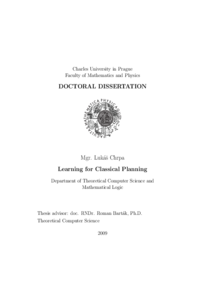Learning for Classical Planning
Learning for Classical Planning
rigorózní práce (UZNÁNO)

Zobrazit/
Trvalý odkaz
http://hdl.handle.net/20.500.11956/24721Identifikátory
SIS: 87944
Katalog UK: 990014573530106986
Kolekce
- Kvalifikační práce [12019]
Autor
Vedoucí práce
Fakulta / součást
Matematicko-fyzikální fakulta
Obor
Teoretická informatika
Katedra / ústav / klinika
Katedra teoretické informatiky a matematické logiky
Datum obhajoby
24. 5. 2010
Nakladatel
Univerzita Karlova, Matematicko-fyzikální fakultaJazyk
Angličtina
Známka
Uznáno
This thesis is mainly about classical planning for articial intelligence (AI). In planning, we deal with searching for a sequence of actions that changes the environment from a given initial state to a goal state. Planning problems in general are ones of the hardest problems not only in the area of AI, but in the whole computer science. Even though classical planning problems do not consider many aspects from the real world, their complexity reaches EXPSPACE-completeness. Nevertheless, there exist many planning systems (not only for classical planning) that were developed in the past, mainly thanks to the International Planning Competitions (IPC). Despite the current planning systems are very advanced, we have to boost these systems with additional knowledge provided by learning. In this thesis, we focused on developing learning techniques which produce additional knowledge from the training plans and transform it back into planning domains and problems. We do not have to modify the planners. The contribution of this thesis is included in three areas. First, we provided theoretical background for plan analysis by investigating action dependencies or independencies. Second, we provided a method for generating macro-operators and removing unnecessary primitive operators. Experimental evaluation of this method...
